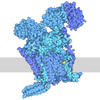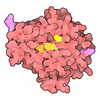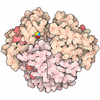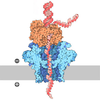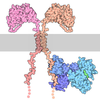[English] 日本語
 Yorodumi
Yorodumi- PDB-1tkn: Solution structure of CAPPD*, an independently folded extracellul... -
+ Open data
Open data
- Basic information
Basic information
| Entry | Database: PDB / ID: 1tkn | ||||||
|---|---|---|---|---|---|---|---|
| Title | Solution structure of CAPPD*, an independently folded extracellular domain of human Amyloid-beta Precursor Protein | ||||||
 Components Components | Amyloid beta A4 protein | ||||||
 Keywords Keywords |  MEMBRANE PROTEIN / FOUR ALPHA-HELICES / THREE-HELICAL BUNDLE / APP / MEMBRANE PROTEIN / FOUR ALPHA-HELICES / THREE-HELICAL BUNDLE / APP /  ALZHEIMER'S DISEASE ALZHEIMER'S DISEASE | ||||||
| Function / homology |  Function and homology information Function and homology informationregulation of epidermal growth factor-activated receptor activity / signaling receptor activator activity / cytosolic mRNA polyadenylation / collateral sprouting in absence of injury / microglia development / regulation of synapse structure or activity / Formyl peptide receptors bind formyl peptides and many other ligands / axo-dendritic transport / synaptic assembly at neuromuscular junction / smooth endoplasmic reticulum calcium ion homeostasis ...regulation of epidermal growth factor-activated receptor activity / signaling receptor activator activity / cytosolic mRNA polyadenylation / collateral sprouting in absence of injury / microglia development / regulation of synapse structure or activity / Formyl peptide receptors bind formyl peptides and many other ligands / axo-dendritic transport / synaptic assembly at neuromuscular junction / smooth endoplasmic reticulum calcium ion homeostasis / axon midline choice point recognition / astrocyte activation involved in immune response / regulation of spontaneous synaptic transmission /  regulation of Wnt signaling pathway / mating behavior / positive regulation of amyloid fibril formation / regulation of Wnt signaling pathway / mating behavior / positive regulation of amyloid fibril formation /  ciliary rootlet / Lysosome Vesicle Biogenesis / ciliary rootlet / Lysosome Vesicle Biogenesis /  PTB domain binding / neuron remodeling / Golgi-associated vesicle / Insertion of tail-anchored proteins into the endoplasmic reticulum membrane / Deregulated CDK5 triggers multiple neurodegenerative pathways in Alzheimer's disease models / presynaptic active zone / : / nuclear envelope lumen / modulation of excitatory postsynaptic potential / suckling behavior / COPII-coated ER to Golgi transport vesicle / dendrite development / PTB domain binding / neuron remodeling / Golgi-associated vesicle / Insertion of tail-anchored proteins into the endoplasmic reticulum membrane / Deregulated CDK5 triggers multiple neurodegenerative pathways in Alzheimer's disease models / presynaptic active zone / : / nuclear envelope lumen / modulation of excitatory postsynaptic potential / suckling behavior / COPII-coated ER to Golgi transport vesicle / dendrite development /  smooth endoplasmic reticulum / smooth endoplasmic reticulum /  regulation of NMDA receptor activity / TRAF6 mediated NF-kB activation / negative regulation of long-term synaptic potentiation / Advanced glycosylation endproduct receptor signaling / neuromuscular process controlling balance / regulation of presynapse assembly / The NLRP3 inflammasome / intracellular copper ion homeostasis / transition metal ion binding / regulation of multicellular organism growth / negative regulation of neuron differentiation / ECM proteoglycans / spindle midzone / positive regulation of T cell migration / regulation of NMDA receptor activity / TRAF6 mediated NF-kB activation / negative regulation of long-term synaptic potentiation / Advanced glycosylation endproduct receptor signaling / neuromuscular process controlling balance / regulation of presynapse assembly / The NLRP3 inflammasome / intracellular copper ion homeostasis / transition metal ion binding / regulation of multicellular organism growth / negative regulation of neuron differentiation / ECM proteoglycans / spindle midzone / positive regulation of T cell migration /  Purinergic signaling in leishmaniasis infection / positive regulation of calcium-mediated signaling / forebrain development / regulation of peptidyl-tyrosine phosphorylation / positive regulation of chemokine production / Purinergic signaling in leishmaniasis infection / positive regulation of calcium-mediated signaling / forebrain development / regulation of peptidyl-tyrosine phosphorylation / positive regulation of chemokine production /  clathrin-coated pit / clathrin-coated pit /  Notch signaling pathway / cholesterol metabolic process / positive regulation of G2/M transition of mitotic cell cycle / positive regulation of protein metabolic process / ionotropic glutamate receptor signaling pathway / neuron projection maintenance / positive regulation of glycolytic process / extracellular matrix organization / response to interleukin-1 / positive regulation of mitotic cell cycle / Notch signaling pathway / cholesterol metabolic process / positive regulation of G2/M transition of mitotic cell cycle / positive regulation of protein metabolic process / ionotropic glutamate receptor signaling pathway / neuron projection maintenance / positive regulation of glycolytic process / extracellular matrix organization / response to interleukin-1 / positive regulation of mitotic cell cycle /  axonogenesis / adult locomotory behavior / dendritic shaft / trans-Golgi network membrane / locomotory behavior / platelet alpha granule lumen / positive regulation of peptidyl-threonine phosphorylation / axonogenesis / adult locomotory behavior / dendritic shaft / trans-Golgi network membrane / locomotory behavior / platelet alpha granule lumen / positive regulation of peptidyl-threonine phosphorylation /  learning / positive regulation of interleukin-1 beta production / learning / positive regulation of interleukin-1 beta production /  central nervous system development / positive regulation of long-term synaptic potentiation / astrocyte activation / endosome lumen / central nervous system development / positive regulation of long-term synaptic potentiation / astrocyte activation / endosome lumen /  Post-translational protein phosphorylation / synapse organization / positive regulation of JNK cascade / microglial cell activation / regulation of long-term neuronal synaptic plasticity / TAK1-dependent IKK and NF-kappa-B activation / Post-translational protein phosphorylation / synapse organization / positive regulation of JNK cascade / microglial cell activation / regulation of long-term neuronal synaptic plasticity / TAK1-dependent IKK and NF-kappa-B activation /  neuromuscular junction / neuromuscular junction /  visual learning / serine-type endopeptidase inhibitor activity / recycling endosome / visual learning / serine-type endopeptidase inhibitor activity / recycling endosome /  cognition / positive regulation of inflammatory response / positive regulation of interleukin-6 production / neuron cellular homeostasis / Golgi lumen / cognition / positive regulation of inflammatory response / positive regulation of interleukin-6 production / neuron cellular homeostasis / Golgi lumen /  endocytosis / positive regulation of non-canonical NF-kappaB signal transduction / Regulation of Insulin-like Growth Factor (IGF) transport and uptake by Insulin-like Growth Factor Binding Proteins (IGFBPs) / cellular response to amyloid-beta / neuron projection development / positive regulation of DNA-binding transcription factor activity / G2/M transition of mitotic cell cycle / cell-cell junction / endocytosis / positive regulation of non-canonical NF-kappaB signal transduction / Regulation of Insulin-like Growth Factor (IGF) transport and uptake by Insulin-like Growth Factor Binding Proteins (IGFBPs) / cellular response to amyloid-beta / neuron projection development / positive regulation of DNA-binding transcription factor activity / G2/M transition of mitotic cell cycle / cell-cell junction /  synaptic vesicle / positive regulation of tumor necrosis factor production / synaptic vesicle / positive regulation of tumor necrosis factor production /  regulation of translation regulation of translationSimilarity search - Function | ||||||
| Biological species |   Homo sapiens (human) Homo sapiens (human) | ||||||
| Method |  SOLUTION NMR / torsion angle dynamics SOLUTION NMR / torsion angle dynamics | ||||||
 Authors Authors | Dulubova, I. / Ho, A. / Huryeva, I. / Sudhof, T.C. / Rizo, J. | ||||||
 Citation Citation |  Journal: Biochemistry / Year: 2004 Journal: Biochemistry / Year: 2004Title: Three-dimensional structure of an independently folded extracellular domain of human amyloid-beta precursor protein. Authors: Dulubova, I. / Ho, A. / Huryeva, I. / Sudhof, T.C. / Rizo, J. | ||||||
| History |
|
- Structure visualization
Structure visualization
| Structure viewer | Molecule:  Molmil Molmil Jmol/JSmol Jmol/JSmol |
|---|
- Downloads & links
Downloads & links
- Download
Download
| PDBx/mmCIF format |  1tkn.cif.gz 1tkn.cif.gz | 728 KB | Display |  PDBx/mmCIF format PDBx/mmCIF format |
|---|---|---|---|---|
| PDB format |  pdb1tkn.ent.gz pdb1tkn.ent.gz | 632.1 KB | Display |  PDB format PDB format |
| PDBx/mmJSON format |  1tkn.json.gz 1tkn.json.gz | Tree view |  PDBx/mmJSON format PDBx/mmJSON format | |
| Others |  Other downloads Other downloads |
-Validation report
| Arichive directory |  https://data.pdbj.org/pub/pdb/validation_reports/tk/1tkn https://data.pdbj.org/pub/pdb/validation_reports/tk/1tkn ftp://data.pdbj.org/pub/pdb/validation_reports/tk/1tkn ftp://data.pdbj.org/pub/pdb/validation_reports/tk/1tkn | HTTPS FTP |
|---|
-Related structure data
| Similar structure data |
|---|
- Links
Links
- Assembly
Assembly
| Deposited unit | 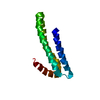
| |||||||||
|---|---|---|---|---|---|---|---|---|---|---|
| 1 |
| |||||||||
| NMR ensembles |
|
- Components
Components
| #1: Protein | Mass: 13155.255 Da / Num. of mol.: 1 Source method: isolated from a genetically manipulated source Source: (gene. exp.)   Homo sapiens (human) / Gene: APP, A4, AD1 / Plasmid: pGEX-KT / Species (production host): Escherichia coli / Production host: Homo sapiens (human) / Gene: APP, A4, AD1 / Plasmid: pGEX-KT / Species (production host): Escherichia coli / Production host:   Escherichia coli BL21 (bacteria) / Strain (production host): BL21 / References: UniProt: P05067 Escherichia coli BL21 (bacteria) / Strain (production host): BL21 / References: UniProt: P05067 |
|---|
-Experimental details
-Experiment
| Experiment | Method:  SOLUTION NMR SOLUTION NMR | ||||||||||||||||||||
|---|---|---|---|---|---|---|---|---|---|---|---|---|---|---|---|---|---|---|---|---|---|
| NMR experiment |
|
- Sample preparation
Sample preparation
| Details |
| ||||||||||||
|---|---|---|---|---|---|---|---|---|---|---|---|---|---|
| Sample conditions | Ionic strength: 250 mM NaCl, 300 mM guanidinium chloride / pH: 6.4 / Pressure: 1 atm / Temperature: 300 K |
-NMR measurement
| Radiation | Protocol: SINGLE WAVELENGTH / Monochromatic (M) / Laue (L): M |
|---|---|
| Radiation wavelength | Relative weight: 1 |
| NMR spectrometer | Type: Varian INOVA / Manufacturer: Varian / Model : INOVA / Field strength: 500 MHz : INOVA / Field strength: 500 MHz |
- Processing
Processing
| NMR software |
| ||||||||||||||||||||||||||||
|---|---|---|---|---|---|---|---|---|---|---|---|---|---|---|---|---|---|---|---|---|---|---|---|---|---|---|---|---|---|
| Refinement | Method: torsion angle dynamics / Software ordinal: 1 Details: the structures are based on a total of 1613 restraints, 1266 are NOE-derived distance constraints, 185 dihedral angle restraints, 162 distance restraints from hydrogen bonds. | ||||||||||||||||||||||||||||
| NMR representative | Selection criteria: lowest energy | ||||||||||||||||||||||||||||
| NMR ensemble | Conformer selection criteria: structures with the lowest energy Conformers calculated total number: 1000 / Conformers submitted total number: 20 |
 Movie
Movie Controller
Controller


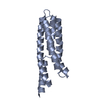
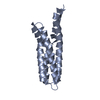
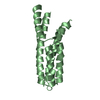
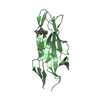
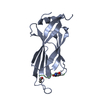
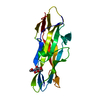
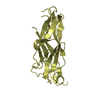
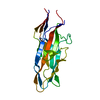
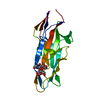
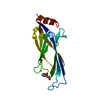
 PDBj
PDBj






